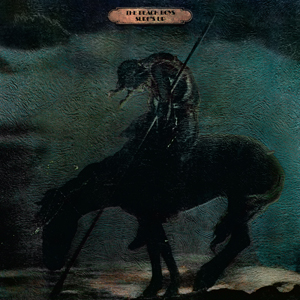
Zack: While I have learned to appreciate some aspects
of country music, others just rub me the wrong way. Dwight Yoakam was in that
category. Musically, Buenas Noches wasn’t overly twangy, but I wouldn’t
describe it as overly appealing. But what really ruined this album for me was
the lyrics and singing. Recently, there was an episode of the Malcolm Gladwell
podcast Revisionist History were he talks about his “theory” (to the extent you
could call it that) that country musicians are better songwriters than rock
musicians (those are the only two genres of music apparently) because they are
more emotional and open to discussing it directly and in vivid detail rather
than vague allusion. I think that’s mostly bullshit, but there might be
something about the directness aspect. Dwight Yoakam is very direct, but I
didn’t like a lot of what I heard. The song What I Don’t Know is predicated on
him threatening a lover, saying that if he finds out that he is being cheated
on then he will murder her. Am I supposed to be moved by the threat of domestic
violence? Am I supposed to find that relatable? The titular track, Buenas
Noches from a Lonely Room, was easily my favorite song on the album. And yet it
too ends with him murdering a former lover (and the mother of his child) who
ran away from him with another man. There are plenty of songs about heartbreak
on here, and that’s fine of course, but it’s hard to rally behind many of the
conclusions. Besides the murder fantasies, I noticed another theme going on:
What we might refer to today as the rural-urban divide. On I Sang Dixie (my
second favorite song, by the way, to show that I am trying to separate my more
analytical thoughts from my evaluations of the songs) Yoakam tells a story of
meeting a dying southern man in Los Angeles and trying to comfort him while
everyone just goes on by. The man’s dying words are telling him to go back to
the south and away from these California weirdos (my words, not his). Streets
of Bakersfield was similar. There, it’s people in San Francisco though, and
it’s mostly just about how he’s tired to being judged by a bunch of people who
don’t know the first thing about where he’s from. The theme of these songs
really rubbed me the wrong way. That is probably a specific temporal anomaly.
I’m writing this a couple days out from the Charlottesville protests, where a
bunch of white supremacists/Neo-Nazis were protesting the removal of a statue
of Robert E. Lee. I just watched a video of another Confederacy statue in North
Carolina being torn down and kicked by anti-white supremacist protestors. There
was a massive march in our adoptive city of D.C. last night protesting a statue
of Albert Pike, a Confederate general. I’m pretty revved up on this issue at
the moment. And I’m pretty fucking tired of hearing a bunch of southern, “Oh
we’re such victims why don’t other people understand us.” Boo fucking hoo.
Southern culture is distinct and has lots of really awesome elements to it that
denizens of the region should absolutely be allowed to celebrate. The food, the
culture of sports and competition, (some of) the music. There’s a lot of great
stuff, for sure. But I’m from New Jersey. You don’t think that when I introduce
myself to someone and they ask where I’m from, I catch a ton of shit? I have a
good friend from Kansas. Flyover country. You don’t think we bust his balls
about that every chance we get. People make fun of where other people are from.
That’s a thing they do. Hell, both of these songs are predicated on stereotypes
of Californians. But I am supposed to weep for the poor, misjudged southerner.
Fuck you. Grow the fuck up. Think about another goddamn person for one fucking
second. And with that, I’ll rage-quit this post/screed.
Favorite Tracks: Buenas Noches from a Lonely Room (She Wore
Red Dresses); I Sang Dixie; Floyd County
Emily: Zack had a lot to say, so I'll keep this brief. Buenas Noches from a Lonely Room is a very old-school country album. It has some twang, a lot of Southern pride, and several Jesus references. I had to do a double-take when I was writing in the date, because it honestly sounds like some of the country music we've listened to from the '50s and '60s. But nope, this is from 1988. I guess there was still a market for old-school country for some old-school people, and that market probably still exists now. But all I can say is that it's definitely not for this decidedly un-Southern girl.
Favorite Tracks: Buenas Noches from a Lonely Room (She Wore Red Dresses); I Got You; I Hear You Knockin'



.jpg)


